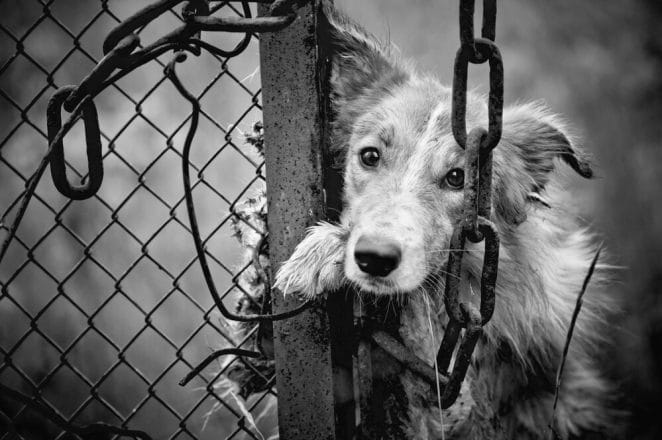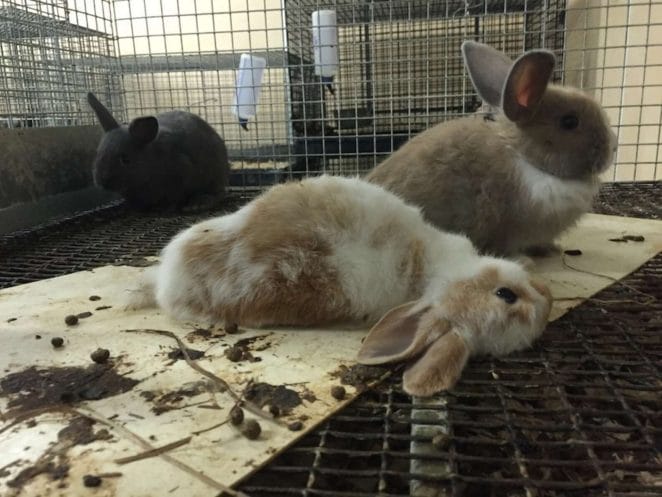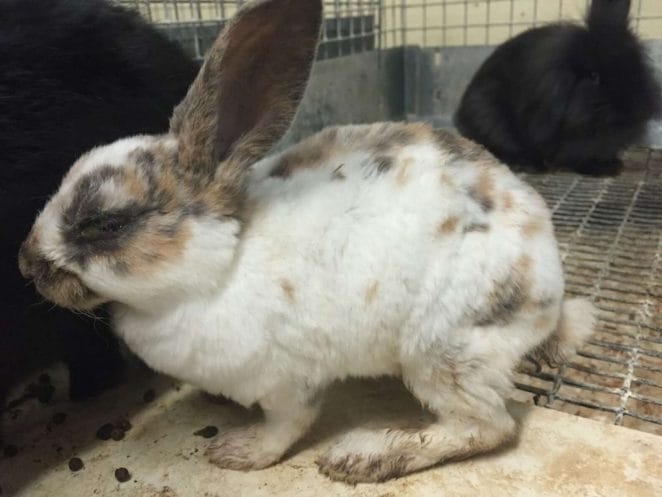
All those adorable animals you see at the pet store may not have been born there. Many small and fluffy pets that are often found in a pet store were originally raised in factory farm conditions or pet mills where they live their entire lives confined to small cages, showing signs of cruelty and neglect
After a three-month undercover investigation, PETA discovered that Holmes Farm, a Pennsylvania breeder supplying animals to Petco and other stores, was not up-to-speed on animal welfare.
Investigators at a California animal storage facility found animals in containers stacked and rarely checked on while the building reeked of feces and blood as cats were allowed to enter and exit crates. “One hamster who had been attacked by a cat was just left to flail and die on the floor,” PETA said.
The rabbits were packed into tiny wire cages filled with piles of feces. Many of them had urine-stained feet or signs of severe illness. They were denied veterinary care.
Another sick rabbit had been dragging his rear legs around for at least a week and was suffering from hair loss. “When an animal-care worker finally noticed the ill bunny, she said that she would ‘check on it’ although no one actually did,” PETA wrote.

Dead rabbits were regularly found in cages with the live ones – up to four were found dead in one day. The rabbits were also kept on wire floors, which can cut through a rabbit’s feet.
Investigators also witnessed literal piles of newborn mice thrown on top of each other in a box, calling out for their mothers “in a bin that smelled'” PETA said.
Hundreds of mice were sealed in plastic bags and thrown into a freezer to die so they could be sold as snake food to owners who want a more humane alternative to live to feed. A clip shows the mice struggling to escape the packed bag; they were still alive 15 minutes later.
When investigators witnessed workers grabbing chinchillas by their tails and throwing hamsters between boxes that were several feet apart, the animals quickly became visibly stressed.
“One worker, who was supposed to be cleaning and reusing boxes for the animals, was actually defecating into empty boxes and putting them right back on the shelf where other hamsters were housed,” PETA said.
PETA released a statement saying that Holmes Farm “is depriving animals of air, light, and freedom.”
“Most animals at Holmes Farm are denied adequate veterinary care, with one cat needing emergency surgery for dental issues and another having a broken foot that was left untreated for so long that it became infected,” the statement said.
Some of the animals had been living in their cages without any food or water for days at a time.
Many of the animals had no water, or only filthy water available—leading to dozens of deaths. When the investigator found hundreds of mice with no water and provided some, they “drank in a” PETA said.
In another incident, 50 small animals were piled into a cooler filled with feces and gassed.
Petco and PetSmart also returned sick and injured animals to the so-called farm, who died within a few days. “Some rats evidently carried rat-bite fever-a potentially fatal disease transmissible to humans that’s led to two lawsuits against Petco.” PETA said.
Holmes Farm supplies animals to hundreds of pet stores along the East Coast, according to PETA.

According to Petco, these claims are not true and that they had already cut ties with Holmes Farm based on the results of its own investigation, yet PETA said that the inspection was conducted on December 2 and saw orders for hundreds of animals being delivered to stores as late as December 14.
PETA is calling for Petco to stop selling animals from Holmes Farm, and that it instead choose adoption or “local shelters and rescues that promise humane treatment of animals.”
Following allegations that Holmes Farms has mistreated animals, including those who are still alive and breathing hours after being slaughtered and skinned for slaughter, the USDA launched an investigation.
Sadly, cases like these are the norm in pet stores rather than the exception. Whether it is a dog or a hamster that you are looking to buy, animals bred for retail often live in filthy conditions and they’re also abused and exposed to illness, their water intake, as well as their quality of veterinary care, are severely limited.
It is also not uncommon for animals to be malnourished, even in the presence of food.
The pet industry is a multibillion-dollar industry that preys on one of our biggest weaknesses as human beings: our love for animals. Some pet stores are able to cash in on this weakness by selling sickly or genetically engineered rodents, birds, and other animals.
Some of these animals are also sold as “teacup” or “dwarf” pets to customers who like the aesthetic, but not the responsibility that comes with owning a living creature.
The conditions at Holmes Farms are inhumane and disgusting—I have never seen worse conditions for pets anywhere.
It is, however, not a unique case.
Petco and PetSmart consistently fail to provide proper care for the animals they sell to the public. A recent undercover investigation by Peta revealed that some of their suppliers were cramming mice into filthy plastic bags alive, defecating on other live animals.
If you’re thinking about adopting an animal, consider adoption rather than a pet store or breeder. Pets are also available at local shelters and rescue groups with even small animals like guinea pigs and hamsters. To get started, visit Petfinder.com.

